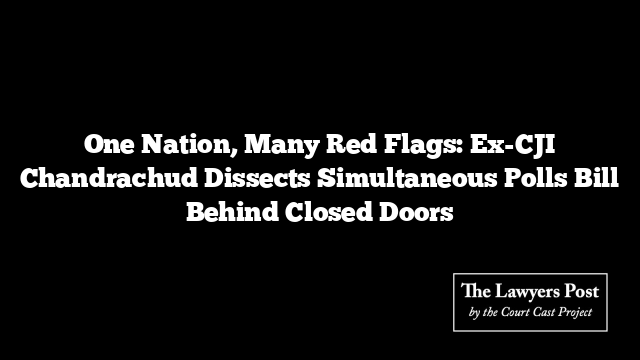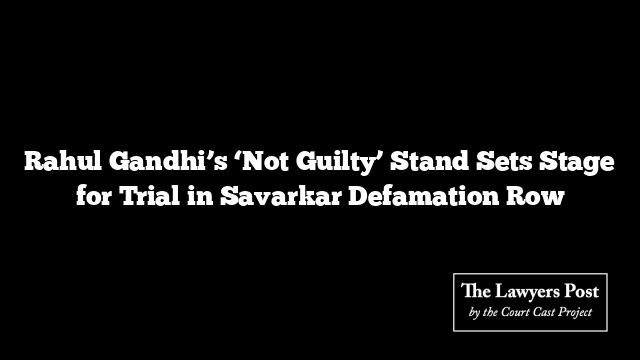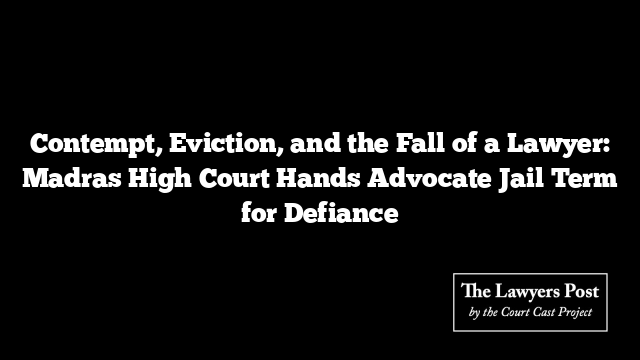In a closed-door session with the Joint Parliamentary Committee (JPC) tasked with scrutinizing the One Nation One Election Bill, former Chief Justice of India DY Chandrachud delivered a pointed, layered assessment: the Bill may not tear the constitutional fabric—but it’s far from tailor-made.
According to individuals in the room, Chandrachud didn’t mince words. While he acknowledged that the Constitution (129th Amendment) Bill, 2024 doesn’t breach the basic structure doctrine, he flagged gaping holes that could undermine democratic accountability if not addressed with precision.
History Doesn’t Repeat, But It Rhymes
Chandrachud revisited post-Independence India’s electoral rhythm, noting that from 1950 to 1960, parliamentary and assembly polls were largely synchronised. In 1957, some state assemblies were even dissolved early just to maintain uniformity with Lok Sabha elections. Constitutionally, simultaneous elections are permissible, he clarified; nothing mandates staggered polls.
However, in today’s vastly different political landscape, synchronisation without adequate safeguards is a recipe for trouble, he suggested. Chandrachud outlined a transitional mechanism: once—only once—state legislatures’ terms could be shortened to match the Lok Sabha’s. After that, both arms would function independently, adhering to their natural five-year tenures unless dissolved early.
Where the Bill Crosses the Line
But the former CJI’s real concern lay elsewhere: in the Election Commission of India’s newfound powers. The Bill, as it stands, proposes allowing the ECI to:
- Modify elements of Part XV of the Constitution to operationalise the Bill.
- Postpone state elections unilaterally if simultaneous polls are deemed impractical.
To Chandrachud, this crosses a constitutional red line. Granting the ECI authority to rewrite core electoral provisions or truncate a legislature’s term through a single report to the President, he warned, is a dangerous precedent.
He invoked Article 356(5) as a constitutional benchmark—state interventions require well-defined processes. Vague authorisations to delay elections threaten that equilibrium.
Three Shields Against Electoral Overreach
To bring the Bill within constitutional bounds, Chandrachud reportedly floated a tripartite remedy:
- Election delays should be allowed only for reasons of national security or breakdown of public order.
- Both Houses of Parliament must ratify any such delay.
- Delays must be time-bound and not open-ended.
Absent these, he warned, the ECI could become too powerful, too opaque—and too dangerous for Indian democracy.
The Constitution’s Blind Spots
Beyond the overreach, Chandrachud highlighted two silent corners of the Constitution the Bill fails to illuminate:
- Emergency Extensions: Article 352 permits term extensions during a National Emergency. The Bill doesn’t clarify whether, post-emergency, terms will be cut short or extended again to maintain electoral symmetry.
- Premature Dissolutions: What happens if a state government falls six months before its term ends? The Bill says nothing. These grey zones, left unchecked, open the door for manipulation and confusion.
His Closing Notes: Simple, Stark, Serious
Chandrachud wrapped up with three distilled takeaways:
- Simultaneous elections, on their own, aren’t unconstitutional.
- The powers granted to the Election Commission must be trimmed and tightly regulated.
- The Bill must close constitutional gaps concerning emergencies and premature dissolutions.
Backdrop to the Debate
The Bill—formally introduced in December 2024—seeks to overhaul India’s electoral system by synchronising Lok Sabha, state, and even local body elections. To test its constitutional waters, a 39-member JPC was formed, with members ranging from Priyanka Gandhi and Supriya Sule to Sambit Patra and Anurag Thakur. BJP MP PP Chaudhary heads the panel.
Since then, the committee has been deep in deliberations, calling on constitutional experts, including multiple former CJIs, to weigh the political vision against legal reality. As Chandrachud’s critique shows, the Bill’s path forward may not be blocked—but it certainly isn’t paved smooth.





